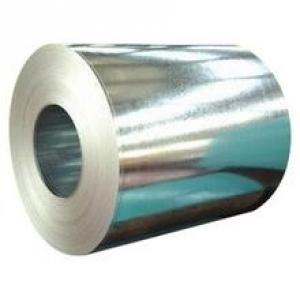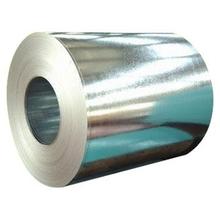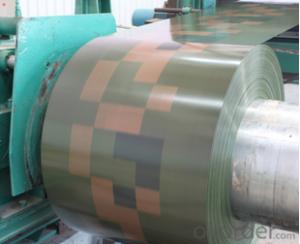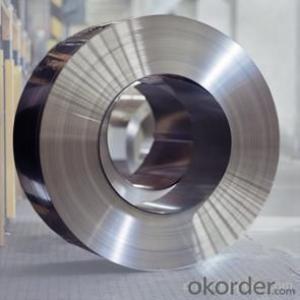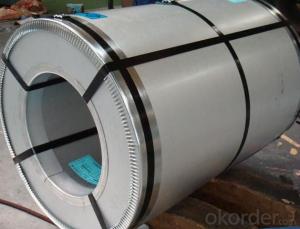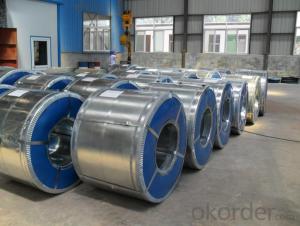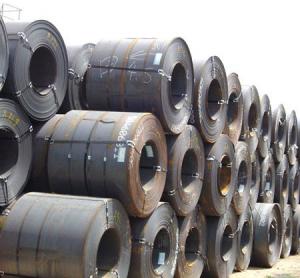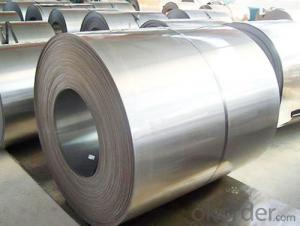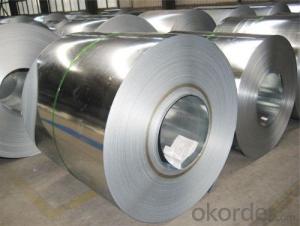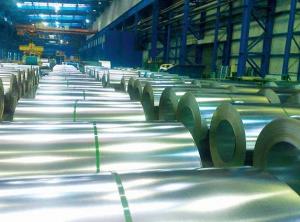Hot dipped Galvanized Steel Coil
OKorder Service Pledge
Quality Product, Order Online Tracking, Timely Delivery
OKorder Financial Service
Credit Rating, Credit Services, Credit Purchasing
You Might Also Like
HOT DIP GALVANIZED STEEL COIL
Specification:0.5mm*1000mm*c
Steel Grade & Standard: ASTM A653
Zinc Coating Mass:Z180 Spangle:Zero Spangle
Surface Treatment: non-chromate, oiled
Coil ID:508mm Coil Weight:6-10MT
Package Type:EYE TO SIDE
Thickness Tolerance:+/-0.02mm Width Tolerance:+/-5mm
Zinc Coating Tolerance:-/+10g/m2
- Q: Consider a steel rod of diameter 4.5 mm and length 3.3 m. If a compressive force of 4900 N is applied to each end, what is the change in the length of the rod?
- You need to calculate the stress on the rod and compare this with the mechanical properties of the steel. It would help if you were given more info. You will need to know something about the steel such as the yeild stress and E, the modulus of elasticity. The value of E is about the same for a wide range of steels. So long as the applied stress is below the yield stress, the strain is all elastic and is calculated from E. The real answer is that you can not answer this question since you do not know what the temperature is. Given the applied load, the change in length will be much different at room temperature than at 1500C.
- Q: What is the standard width of steel coils?
- The standard width of steel coils varies depending on the specific industry and application, but it is commonly around 36 inches to 72 inches.
- Q: like building steel beams. i'm pretty sure with a sawzall.
- I am going to take a slightly different approach. Once the structural steel is manufactured and then brought to the fabricator, not much heat is applied to the steel. It is normally punched, sheared or whatever buy the use of a lot of heat on it is normally not allowed due to the change in the properties of the steel. Once in the field to be erected, the cutting or welding on it are held to absolute minimums and most of the time not allowed at all.
- Q: How much money do you think I could get per lb if I wanted to trade in scrap steel material?
- Scrap steel is usually traded per ton. Average steel prices fluctuate on a daily basis. General prices for scrap steel are around $100 - $200 per ton. For daily scrap steel prices check the source below
- Q: The strip tower height
- Definition and appearance: the ends of the steel coils are uneven, one circle higher than the circle, showing a different degree of pagoda shape or bread shape.
- Q: In pounds per square inch what is the tensile strength of strong steel?
- I okorder /
- Q: What are the different methods of stretch leveling steel coils?
- There exists a variety of methods for stretch leveling steel coils, each possessing their own unique advantages and applications. 1. Roller Leveling: This method entails passing the steel coil through a sequence of rollers that apply pressure to stretch and flatten the material. It is a widely utilized technique for leveling steel coils and grants excellent control over the leveling process. Roller leveling proves suitable for thin and medium gauge steel coils. 2. Tension Leveling: In this approach, high tension forces are applied to the steel coil via a set of bridle rolls. The tension aids in elongating and flattening the material, resulting in a level and stress-free coil. Tension leveling proves particularly effective for thicker and harder steel coils. 3. Laser Leveling: Laser technology is harnessed in this method to assess and rectify any imperfections present in the steel coil. A laser scanner diligently scans the surface of the coil and detects variations, which are subsequently adjusted by a laser beam. Laser leveling provides exceptional precision and is suitable for leveling delicate and high-value steel coils. 4. Stretcher Leveling: This method involves exceeding the yield point of the steel coil, leading to permanent deformation and the elimination of residual stresses. Stretcher leveling is commonly employed for heavy gauge coils and is capable of achieving substantial improvements in flatness. 5. Tensionless Leveling: As the name implies, tensionless leveling is executed without the application of tension to the steel coil. Instead, hydraulic or pneumatic pressure is employed to stretch and flatten the material. This method is ideal for delicate or sensitive steel coils that may be susceptible to damage under high tension forces. Each method of stretch leveling steel coils possesses its own set of advantages, such as control, precision, or suitability for specific types of steel coils. The selection of the appropriate method relies on factors such as the thickness, hardness, and quality requirements of the steel coil, as well as the desired flatness and surface finish.
- Q: What are the dimensions of steel coils used in the metalworking tool industry?
- The metalworking tool industry has a wide range of dimensions for steel coils, which can vary depending on the specific application and requirements of the tool. However, there are certain dimensions that are commonly observed in this industry. Steel coils used in metalworking tools typically come in different widths, ranging from 24 inches to 72 inches. The thickness of the coils can also vary, with common thicknesses ranging from 0.020 inches to 0.250 inches. Moreover, the length of the coils can vary significantly, with standard lengths usually falling between 100 feet and 2000 feet or even more. These dimensions are selected based on several factors, such as the type of metal being worked, the specific tool being used, and the desired outcome of the metalworking process. Additionally, other factors like the weight and handling capabilities of the tool, as well as the efficiency of the manufacturing process, may also influence the dimensions of the steel coils used. To ensure the appropriate dimensions for steel coils in the metalworking tool industry, it is essential to consult with manufacturers, suppliers, or industry experts. This is crucial because these dimensions can vary based on specific needs and preferences.
- Q: Can steel coils be used in the production of automotive parts?
- Yes, steel coils can be used in the production of automotive parts. Steel coils are often used in the manufacturing process of various automotive components such as body panels, frames, chassis, suspension parts, and engine parts. The steel coils are typically processed through various methods such as cutting, stamping, bending, and welding to shape them into the desired automotive parts. Steel is a preferred material for automotive parts due to its strength, durability, and resistance to corrosion. Moreover, steel coils are available in different grades and thicknesses, allowing manufacturers to tailor the material properties to meet specific requirements for different automotive applications. Overall, steel coils play a critical role in the production of automotive parts, contributing to the performance, safety, and longevity of vehicles.
- Q: What are the common defects found in uncoiled steel coils?
- Some common defects found in uncoiled steel coils include surface defects such as scratches, dents, and rusting, as well as dimensional defects like coil width variation, edge waviness, and coil set. Other defects may include coil breaks, oil spots, and uneven winding tension.
Send your message to us
Hot dipped Galvanized Steel Coil
OKorder Service Pledge
Quality Product, Order Online Tracking, Timely Delivery
OKorder Financial Service
Credit Rating, Credit Services, Credit Purchasing
Similar products
Hot products
Hot Searches
Related keywords
